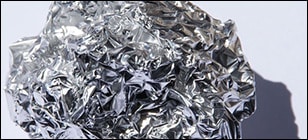Aluminium – Uses, Benefits, Sources and Dosage

The word Aluminium is derived from the Latin word alumen which means bitter salt. It is the 3rd most abundant element in the earth. Exposure of Aluminium in high concentration leads to several health effects. It is therefore considered toxic metal. Aluminium can enter our body through food, or by breathing or by direct contact through the skin.
Intake Of High Concentration Of Aluminium Results In Various Health Problems
- It leads to loss of memory.
- It may damage central nervous system.
- It leads to dementia.
- It leads to severe trembling.
- It leads to lung problems such as coughing.
- It may cause effects on the kidney.
- High levels of Aluminium in drinking water lead to bone disease and muscle weakness.
- It leads to delayed growth in children.
- It affects the musculoskeletal system.
Sources Of Aluminium
Foods like baking powder, processed cheese contains aluminium higher than natural levels because they contain aluminium based food additives. Ingestion of Aluminium based food additives leads to Alzheimer’s disease. Aluminium is used in manufacturing of utensils because it is a good conductor of heat. It allows food to cook evenly.
Cooking of acidic foods like fruits, tomatoes and wine etc. in aluminium pans may lead the toxic aluminium to enter into our body through ingestion of these cooked foods.
Pickles also contain a certain amount of aluminium in it. This is because during the preparation of pickles, an alum, is added in order to add firmness and crispness to the pickles. An alum is an aluminium salt such as aluminium sulfate or potassium aluminium sulfate.
The other source of aluminium is deodorants which we use in our daily life. Even certain antacid medicines also contains aluminium.
Nutrients Depleted By High Concentration Of Aluminium
Aluminium disturbs the calcium phosphorus balance in our body which is essential for the healthy body. The nutrients that gets destroyed by the ingestion of high concentration of aluminium includes calcium, copper, iron, magnesium, phosphorus, potassium, Vitamin B12, and Vitamin B1.
Depletion of this nutrients result in various health problems such as deficiency of calcium leads to osteoporosis while deficiency of iron leads to anemia and it also weakens the immune system. Deficiency of vitamin B12 leads to unhealthy functioning of heart. Deficiency of potassium leads to muscle pain. While the deficiency of other nutrients leads to various other health problems as well.
Conclusion
As an aluminium is a toxic element and causes several health effects and hence should be avoided. In order to avoid entry of aluminium into food cooked using aluminium utensils, manufacturers developed anodized aluminium. Anodized aluminium retains the heat conducting property, but it creates a hard surface which in turn does not react with the food. Vitamin C is recommended to balance the aluminium salts in the body. Garlic, wheat grass and seaweeds can also be useful in balancing the Aluminium salts.



